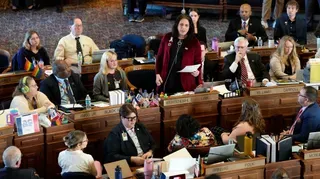February 4, 2012
'Silence is Death' Highlights Link Between Churches and Rise in Local African American HIV Rates
Kevin Mark Kline READ TIME: 3 MIN.
According to the Florida Department of Health's report titled Silence is Death: The Crisis of HIV/AIDS in Florida's Black Communities, through 2005, Palm Beach County faced the second highest AIDS infection ratio in blacks in the state. The report stated that 1 in 42 blacks were infected with HIV/AIDS at the time and while blacks made up only 14 percent of the state's population, they accounted for 51 percent of all AIDS cases in Florida.
Fast-forward to 2009 and the making of the documentary "Silence is Death: Unheard Voices." Commissioned by the county in response to the report, and made on a budget of $5,000, the film was produced by then Statewide Black MSM (Men Who Have Sex With Men) Coordinator for the Florida Department of Health, Lorenzo Robertson, and sought to further explain the statistical phenomena presented in the report.
While clearly produced with minimal resources, the film is anything but lacking in substance. To the contrary: it digs deep in to black culture and explains - through its subjects - how the church's preaching of hate towards homosexuality and lack of attention to HIV/AIDS as a result has played a major role in the disproportionate number of HIV positive gay, black men.
All of the gay men featured in the film concede to growing up with the church as a part of their lives, a major common denominator amongst them being a general lack of understanding of their feelings at a young age. Their experiences point to early ignorance through no fault of their own.
"David," a subject in the film, reflects on his experience of learning how to identify the feelings he had saying, "The first time I knew I was gay was at 13. I had a discussion with a friend and that's when he told me the "term" for what I was doing. I've always known [I was gay], but just found out that's what you called it."
"Abdul," recounts that while he knew he was gay, he was afraid of losing his loved ones and his sense of community by coming out.
"I was raised in the church where they said if you were gay you were going to hell," he says.
Indeed, the notion of "hell" is a recurring theme throughout the film and acts as a catalyst for both the men's struggles with their sexuality and, on the other side, the church's views of why the topic of homosexuality is handled with such strict ignorance and aversion.
Speaking on behalf of the church, Reverend Dr. Isaiah S. Clark - who is not referred to by name in the film, but is associated with at least one church in Riviera Beach according to online business records states, "The soul of a homosexual...goes to the place of torment, waiting for the second resurrection...into the fire, dying a second death," he says.
When asked about how best to discuss the topic of HIV/AIDS, he states simply that the topic need not be discussed and the problem would be best regulated if people were to heed the teachings of the bible.
These examples demonstrate the interplay in the film between confused subject -- once a child who listened to someone presumably very similar to Clark - and avoidant teacher, with a single point of view and no reason to discuss it more than once. According to Robertson, it is this interplay that helps support the overriding hypothesis that the black church is not doing enough to address the issues of HIV/AIDS or homosexuality.
Black, gay and infected with HIV himself, Robertson also makes it a point to make a case for individual responsibility despite the church.
"You can't make sure anyone else is protected, but you can protect yourself," he says.
As for the church, he says the state understands the need to engage churches in reaching out to members of the community regarding both sexuality and HIV/AIDS, and has made some strides in the form of special programs designed to raise awareness. But what the state can do, he admits, is marginalized by budgetary constraints.
In lieu of what cannot be provided, he points interested parties to WeMakeTheChange.com, a Web based campaign designed to help engage blacks, minorities and their churches in further education about HIV/AIDS and gay issues.
"Silence is Death: Unheard Voices" opened in 2010 at the Muvico Palace in City Place. It has since been shown to select audiences for educational purposes. The next showing is on Feb. 12 at the Wolfsonian Museum FIU. It is being sponsored by InterFaith OUT in conjunction with SaveDade.org. For ticket information, please call 305-751-7283 or visit http://tinyurl.com/DefendingOurIdentities. Tickets are free and include a wine and cheese reception following the show. Limited seating is available and RSVP is required.






